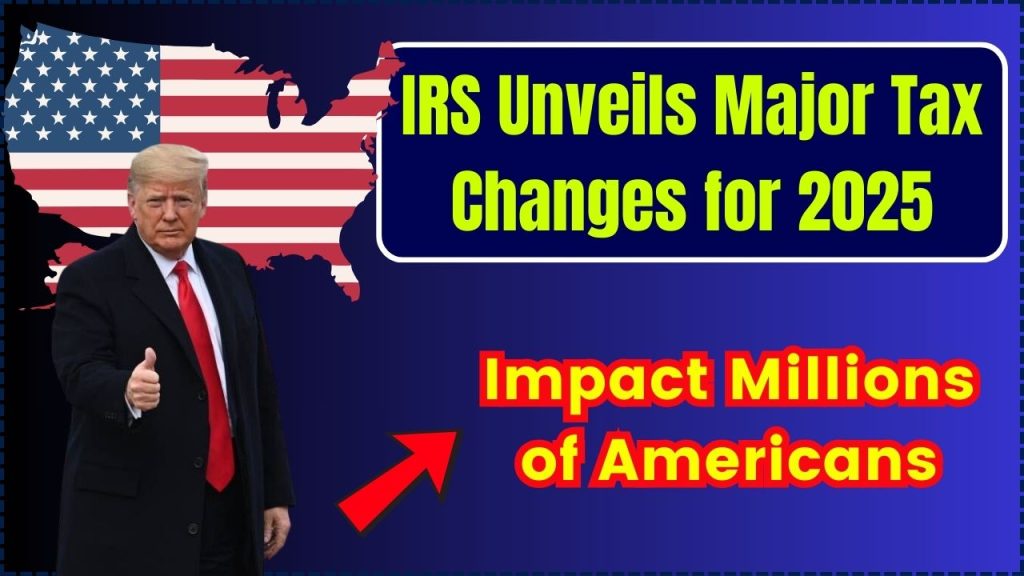IRS Unveils Major Tax Changes for 2025: The Internal Revenue Service (IRS) recently unveiled significant tax updates for 2025, affecting millions of Americans. These changes include adjustments to tax brackets, increases in the standard deduction, and updates to the Earned Income Tax Credit (EITC), all aimed at offsetting inflation. Additionally, the potential expiration of the 2017 Tax Cuts and Jobs Act (TCJA) provisions may impact taxpayers starting in 2026. This article will break down each of these changes and provide practical advice to help you understand what they mean for you.

IRS Unveils Major Tax Changes for 2025
| Key Tax Change | Details | Impact |
|---|---|---|
| New Tax Brackets | Adjusted for inflation; top rate starts at $626,350 for single filers | Prevents “bracket creep” from inflation |
| Standard Deduction Increase | $15,000 for single, $30,000 for joint filers | Lowers taxable income for more Americans |
| EITC Increase | Up to $8,046 for eligible families | Provides higher support for low-income earners |
| Expiration of TCJA Provisions | Tax rate changes, reduced deductions | Potential tax increase in 2026 if not extended |
| Estate Tax Revisions | Exemptions set to revert to lower levels | Higher estate taxes for high-net-worth individuals |
| Super Catch-Up for Retirement | Extra $3,750 catch-up for ages 60-63 | Boosts retirement savings for older workers |
The IRS tax changes for 2025 aim to adjust for inflation and prepare for potential shifts in the Tax Cuts and Jobs Act of 2017 provisions. While these updates provide relief for some, they also signal possible challenges beyond 2025. By understanding these changes, taxpayers can better manage their finances and reduce their tax burdens. Planning, adjusting withholdings, and maximizing deductions can make a significant difference in navigating these new tax adjustments.
Understanding the Key Tax Changes for 2025
Adjusted Tax Brackets for 2025
The IRS regularly adjusts income tax brackets to account for inflation, a practice that ensures people don’t face higher taxes simply because of inflationary income gains, often referred to as “bracket creep.”
In 2025:
- The top tax rate of 37% will apply to single filers earning over $626,350 and married couples filing jointly with incomes over $751,600.
- Lower brackets will also adjust to slightly higher income thresholds.
Example:
If your income increased slightly due to inflation but you didn’t receive a major raise, these adjustments could help you avoid moving into a higher tax bracket, keeping your tax rate the same as before.
Increased Standard Deduction
One of the most impactful changes is the increase in the standard deduction:
- Single filers: $15,000 (up from around $13,850 in 2024).
- Married couples filing jointly: $30,000.
This higher deduction is significant because it allows taxpayers to lower their taxable income, potentially reducing the amount they owe in taxes. For example, if you’re a single filer with an income of $50,000, your taxable income after the deduction would be $35,000, potentially placing you in a lower tax bracket.
Enhanced Earned Income Tax Credit (EITC)
The Earned Income Tax Credit (EITC) is designed to support low- and moderate-income working families and will also see an increase in 2025:
- The maximum EITC for taxpayers with three or more qualifying children will increase to $8,046.
- Eligibility caps: Those earning below $63,398 with investment income under $11,000 may qualify.
This adjustment provides extra financial support for families, especially those with children.
Expiration of Tax Cuts and Jobs Act (TCJA) Provisions
The Tax Cuts and Jobs Act (TCJA) of 2017 introduced several favorable provisions that are set to expire at the end of 2025. If Congress does not act to extend them, many Americans will see changes, including:
- Increased tax rates for many income brackets.
- Reduced standard deductions returning to pre-TCJA levels.
If these provisions are not extended, it could result in higher tax bills starting in 2026.
Estate Tax Exemption Adjustments
Under the TCJA, the estate tax exemption was raised significantly, reducing estate taxes for high-net-worth individuals. However, in 2025, this exemption will revert to its previous level:
- For those with large estates, this could mean increased estate tax liabilities if the exemption threshold is lowered.
Super Catch-Up Contributions for Retirement
In a new rule for 2025, individuals aged 60 to 63 will be able to make super catch-up contributions of an additional $3,750 to their 401(k) retirement accounts. This provision is designed to help older workers nearing retirement build their savings faster, especially for those who may have fallen behind on contributions.
Tax Planning Strategies for 2025
1. Review Your Tax Withholdings
Consider adjusting your withholding allowances to reflect changes in tax brackets and deductions. This can help ensure that you avoid a large balance or refund at tax time.
2. Plan for Higher Estate Taxes
If your estate value is near the current exemption threshold, consult with an estate planner to explore strategies that could help reduce potential estate tax liabilities if the exemption decreases.
3. Maximize the EITC if Eligible
If you qualify for the Earned Income Tax Credit (EITC), make sure to understand the eligibility criteria and claim the credit. This can provide significant financial support for low-income earners.
4. Utilize Retirement Catch-Up Contributions
If you’re between ages 60 and 63, plan to take advantage of the super catch-up contributions to your retirement accounts. These additional savings can make a significant difference in your financial security during retirement.
5. Monitor Legislative Changes
With the TCJA provisions set to expire, stay updated on legislative actions that could affect your future tax liabilities. Keeping an eye on potential tax law changes can help you make timely adjustments.
Cash App Settlement Payouts Up to $2,500: Check Eligibility and How to Claim Your Share
November 2024 SNAP & WIC Benefits Update: New Income Limits and Eligibility Details You Need to Know
FAQs On IRS Unveils Major Tax Changes for 2025
1. What are the new tax brackets for 2025?
The tax brackets have been adjusted for inflation. The top bracket, for instance, now applies to individuals earning over $626,350 and couples earning over $751,600.
2. How does the increased standard deduction benefit me?
The higher deduction amount means more of your income is exempt from taxation, potentially lowering your tax liability.
3. Will the 2017 Tax Cuts and Jobs Act provisions expire in 2025?
Yes, many TCJA provisions are set to expire at the end of 2025, meaning possible tax rate increases in 2026 unless Congress acts to extend them.
4. Who qualifies for the Earned Income Tax Credit (EITC)?
Eligibility is based on income and family size, with maximum benefits available to those with three or more qualifying children and an income below $63,398.
5. What is the “super catch-up” contribution for 401(k)s?
Starting in 2025, individuals aged 60 to 63 can contribute an extra $3,750 to their retirement accounts, helping boost retirement savings.
6. How can I reduce potential estate taxes with the upcoming changes?
Working with an estate planner to explore trusts and other estate-planning strategies can help reduce potential estate tax liabilities, especially with the exemption set to decrease.
Helpful IRS Tools and Resources
To make tax planning easier, the IRS offers various tools and resources:
- IRS Withholding Calculator: irs.gov/withholdingcalculator
- EITC Assistant: irs.gov/eitcassistant
These resources are valuable for reviewing your current tax situation and understanding how new credits or deductions might apply to you.

